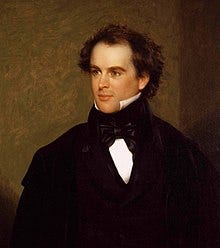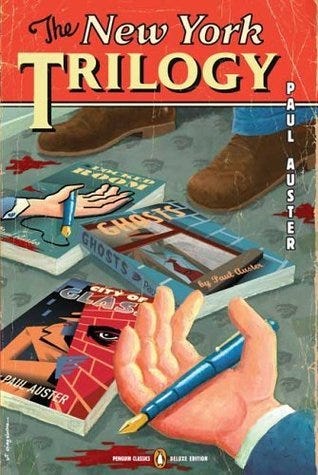New Yorker, Old Hawthorne
Deborah Treisman on story-work, Becca Rothfeld on excess, a reflection on Paul Auster.
The Cosmic Library’s new Short Stories season has episodes freely available now, wherever you go for podcasts. The first episode of this fifth season follows conversations with luminaries around a central question: what is the deal with short stories? The second episode focuses on a thrilling reading of Nathaniel Hawthorne’s “Wakefield,” in its entirety.
FROM EPISODE ONE
I wanted to figure out how short stories aren’t just short novels. I think we did figure this out, and the answer is that short stories do something with emphatic brevity, which often puts a kind of “fill-in-the-blanks” onus on the reader. Deborah Treisman, fiction editor at The New Yorker, says in the first episode:
Good short stories make the reader do some work. Good novels do too. I mean, even if you get all the colors of the rainbow, you still have to fill in the sky behind it. When I see a story that doesn't work, often it's a matter of over-telling.
FROM EPISODE TWO
The actor Max Gordon Moore reads Nathaniel Hawthorne’s uncanny story “Wakefield,” in its entirety, in episode two. Here’s my behind-the-scenes reflection:
I recorded Max in a WeWork space in Manhattan. The room wasn't soundproofed, and I wondered what someone passing by would make of this nineteenth-century figure coming to life in that uncanny NYC office space. Today I’m still thinking about Wakefield in New York—this episode came out on the day the world learned that Paul Auster had died, and Auster’s New York Trilogy was where I first encountered “Wakefield.” I don’t mention Auster’s reflection of/on “Wakefield” in this episode, but Max and I had talked about the Auster connection after taping.
The listener will have to fill in that blank, and here’s where to start: The New York Trilogy. Anyone looking for more Wakefield should read it.
Echoes of “Wakefield” are one indication of the story’s power. Hawthorne really does make the reader do some work, to use Deborah Treisman’s phrase. Some readers might never stop doing that work after reading or hearing “Wakefield.” The narrator tries strenuously to impose a moral on a situation so mysterious that it mostly evades such a moral, and the reader has no choice but to try to make some independent sense of it.
Here’s the narrator’s attempted conclusive moral:
Amid the seeming confusion of our mysterious world, individuals are so nicely adjusted to a system, and systems to one another and to a whole, that, by stepping aside for a moment, a man exposes himself to a fearful risk of losing his place forever. Like Wakefield, he may become, as it were, the Outcast of the Universe.
Listen to episode two to find out whether that moral really covers things. And note how podcastable “Wakefield” is—it’s a first-person obsessive analysis of a weird story the narrator encountered in mass media. In that way, “Wakefield” is basically already a podcast, just from the 1830s.
A lurking big idea this season is that podcasts are an especially literary form, and I think the “Wakefield” episode makes that point by showing more than telling. Or by showing while telling.





